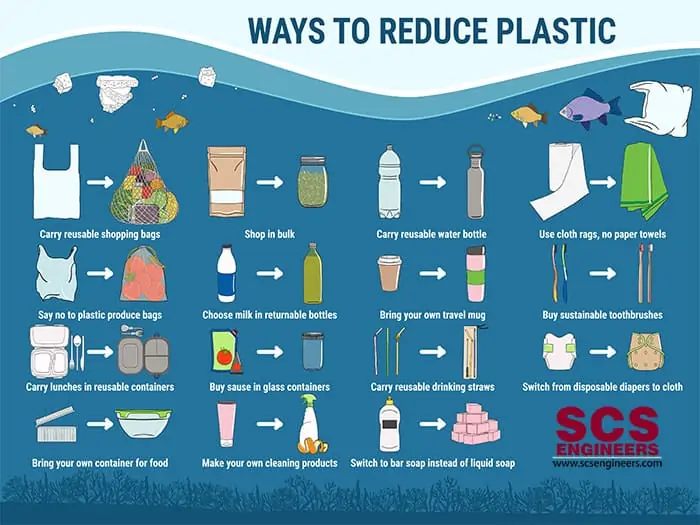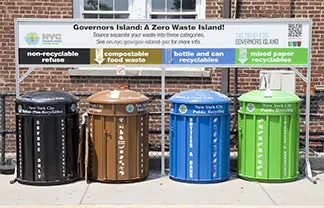


As noted in Waste360, SWANA’s recent report, “Reducing Contamination in Curbside Recycling Programs,” shows stubborn resistance to recycling even after an intense education and enforcement campaign in two towns. A bit more than one-quarter of the households simply didn’t seem to care. While the solid waste industry finds that hard to comprehend, we’re always looking for solutions, and we don’t give up.
Here’s a simple set of recommendations from Consumer Reports published in September for using less plastic. After all, if you don’t recycle, at least try to use less plastic! Most of the recommendations will save you a lot of money and are easy to do, some of which you’re probably already doing.
Thanks to Consumer Reports for its outstanding article that we share with you here.
When excess food at any stage of the food system can’t be diverted to people in need, the next best option is to feed it to animals. Even with the best systems in place to develop an efficient food system, there will always be some fraction that is not fit for consumption. This material should be recycled and reused to minimize the environmental burden and allow for recovery of part of the resources initially used in its production, processing and transport, creating a more circular food system.
In a circular system, food waste is recycled by treatment to stabilize it, anaerobic digestion and composting are common food waste treatment technologies used to stabilize waste and produce residual materials that can replenish the soil, thus contributing to a circular food system. While a circular system uses resources more efficiently, the approach is not without risk. The authors of this paper investigated heavy metals, halogenated organic compounds, foodborne pathogens and antibiotic resistance genes (ARGs) in the food system and their fates during digestion and composting.
While not impossible to mitigate, design, planning, and waste characterization play tremendous roles in sustainable systems.
Jump to:
Setting up a school zero waste program takes time, patience, excellent collaboration and communication, and a team that wants to achieve the same goal of zero waste. Tracie Bills recommends a realistic approach in her article. She provides examples and describes how a consulting firms, such as SCS Engineers, assist schools without materials management programs to launch zero waste programs.
Building a successful program does not happen overnight, but you can do it!
Tracie Onstad Bills is SCS Engineers Northern California Director of Sustainable Materials Management. She has over 20 years of materials management experience, including working for a hauler, a county government, and a nonprofit, and over 12 years of experience with materials management consulting firms. She has provided commercial sector materials flow assessments; organics processing research and analysis; waste characterization studies; and recycling, organics, and waste management technical assistance to government agencies, schools, multi-family dwellings, and businesses. Ms. Bills has an environmental science degree from San Jose State and is an instructor for the SWANA Zero Waste certification program.
Share these valuable resources directly from the SCS Website.
ReFED, the San Francisco-based nonprofit committed to reducing food waste in the U.S., has released the Food Waste Action Guide for the foodservice and restaurant sectors, which state that there is a 16 million ton opportunity to reduce food waste and to recover the equivalent of 1.5 billion meals per year within the two sectors.
The guide follows the 2016 publication, A Roadmap to Reduce U.S. Food Waste by 20 Percent. Both publications were developed in partnership with the Food Waste Reduction Alliance (FWRA) along with input from more than 80 expert contributors and a number of restaurants across the country, are designed to help industry leaders develop and implement food waste reduction strategies.
They provide best practices and strategies as well as present a set of proven prevention, recovery and recycling solutions to help the foodservice and restaurant sectors prioritize and accelerate waste reduction activities. Food waste reduction is quickly becoming a key element of financial and reputational value for restaurants and foodservice providers.
National Waste and Recycling Association is sponsoring a FREE 90-minute webinar on December 6 at 3:00 pm ET. The webinar is highlighting the programs, strategies, and best practices of their six 2017 Recycling Award Winners.
The recipients will describe their unique blend of technologies, outreach, and program management that made a difference in their communities. The audience will have a chance to ask questions and find out how to implement these innovative ideas into their own operations and businesses.
Agenda:
More Solid Waste Management resources and success stories here.
The Pennsylvania Department of Environmental Protection (DEP), Bureau of Waste Management, has awarded SCS Engineers (SCS) a contract to provide recycling and organics management technical assistance to local governments throughout the state. Brent Dieleman, SCS’s Project Manager, has years of experience administering these types of programs for the Solid Waste Association of North America.
Pennsylvania ratified “Act 101” in 1988 to manage waste and promote recycling across the Commonwealth. The DEP developed the Recycling Technical Assistance Training Program to help local governments comply with Act 101 by improving and expanding their collection and diversion programs. SCS will help administer and provide technical assistance to this Program. The comprehensive support provides for curbside and drop-off recycling programs, solid waste planning, public education, materials processing, equipment, technical training, environmental protection programs, and organics management.
Additionally, local governments can apply for technical assistance, up to $7,500 per applicant, to help expand and improve their recycling and organics management systems. SCS will work with applicants to assess their needs and refine the scope of their project. Once DEP approves a technical assistance project, SCS will then provide specialized, tailored training to each recipient.
SCS will help each grant recipient address the unique issues and challenges facing their program including, composting, collections, incentive-based programs such as pay-as-you-throw, and siting of new facilities. SCS anticipates providing technical assistance for up to 30 local governments annually.
DEP is tasking SCS with helping them find ways to further promote the Program across the Commonwealth and enable local governments to benefit from it. SCS anticipates presenting the initiative to local landfill owners and operators at a seminar in Harrisburg, Pennsylvania on June 9, 2017.
“In recent years Pennsylvanians have recycled nearly 17 million tons of waste, which removed almost 16 million tons of carbon dioxide emissions from the air. That is equivalent to saving the electricity used in 2.18 million American homes per year or taking 3.34 million passenger vehicles off the road for one year,” said Brent Dieleman. “We’re facilitating the DEP to help local governments efficiently expand their recycling programs.”
Increasingly, solid waste and recycling agencies are being asked by their political decision makers to improve efficiency, focus on customers, and reduce increased costs. Many agencies are managed with a combination of manual processes, desktop computer tools, limited vehicle and cart tracking and management tools, and custom databases. While effective, these methodologies often entail more effort, labor, and costs.
Smart technologies are expected to grow substantially over the next decade as agencies attempt to minimize their overall costs in solid waste collection and recycling and increase overall efficiency. As discussed briefly in this article, smart technologies have advantages and disadvantages. As agencies investigate technology to help support their service, ensure continued quality service delivery and meet demanding business requirements, it is important to conduct feasibility assessments to evaluate the economic costs to implement and update the use of new technologies in a sustainable manner.
Marc J. Rogoff and Laurel Urena of SCS Engineers.
In the EPA’s Region 9 U.S.-Mexico Border Program Progress Report, April-September 2016
The Campo Band of Mission Indians (CBMI) staff members are working with the EPA and SCS Engineers to address their waste management needs. SCS Engineers, an environmental engineering firm, was contracted by the Border Environment Cooperation Commission to work with CBMI in response to their request for technical assistance.
SCS Engineers was contracted to prepare a waste characterization study to support the development of a zero waste plan. The study provides critical information for designing and developing the future programs, policies, and facilities to effectively achieve a zero waste program.
Based on the findings, CBMI will assess their infrastructure needs, including consideration of a transfer station. SCS Engineers conducted field sampling to assess the Golden Acorn Casino in September 2016, the same month that Jeff Scott, EPA’s Land Divison Director visited Campo.
The Border 2020 Program is the latest environmental program implemented under the 1983 La Paz Agreement. It builds on the Border 2012 Environmental Program, emphasizing regional, bottom-up approaches for decision making, priority setting, and project implementation to address the environmental and public health problems in the border region. As in Border 2012, the new Program encourages meaningful participation from communities and local stakeholders.

Read the full article by Marc Rogoff, SCS Engineers.
“This program directly supports the county’s Roadmap to a Sustainable Waste Management Future by helping businesses to implement recycling programs,” says Leonard. “And not only recycling but waste reduction, as well, all of which, of course, contribute to reducing greenhouse gas emissions, resource management and sustainable materials management.”
Read the article about L.A. County’s Plan for Sustainable Waste Management